Even now, days later, the very thought of Daniel Barenboim leaves me exhausted. Over the course of a week, I trotted behind as he charged across the world’s widest avenue – the Avenido 9 de Julio in Buenos Aires, 110 metres and four red lights across – wafting a large Cuban at the oncoming traffic. I was press-ganged into his campaign to eat more pudding than the waiters thought absolutely wise. Only one of us came out a happier man. Even the adjectives were explosive: in Barenboim-world, nothing is merely fine – it is “fun-TUSS-tic”. At 73, he is among the most venerated of all classical musicians. He is also as relentless as a stag weekend.

“To be famous young and to make fame last – the secret of combining the two is glandular,” Kenneth Tynan wrote of Noël Coward. “It depends on energy.” The same goes for Barenboim. Born in Buenos Aires in 1943, he gave his first piano recital there at seven, was making records by 11, and debuted, age 13, at the Royal Festival Hall. At the end of this decade, he will mark 70 years on stage. The celebration plans are already being drawn up.
The rest is mythology. How the great Wilhelm Furtwängler declared, “The 11-year-old Barenboim is a phenomenon.” His marriage at 24 to cellist Jacqueline Du Pré and their stint as a golden couple, before multiple sclerosis forced her to give up playing. The friendship the Argentine-Israeli pianist and conductor formed with the American-Palestinian literary theorist Edward Said that led to them founding the West-Eastern Divan Orchestra, a forum for “Israeli, Palestinian and other Arab musicians” to meet, talk and play alongside each other.
But to meet the conductor in Buenos Aires, hammering out the programme that he will bring to the Proms on 17 August was to see something less stately and more volatile. It was to witness how a legend is maintained.
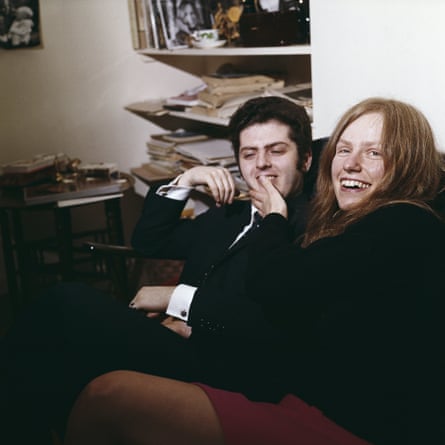
My introduction began at 10.30 sharp on a Tuesday morning. The musicians of the West-Eastern Divan Orchestra are gathered onstage at the Teatro Colon opera house. In jeans and sweatshirts, the eldest among them were still only half the age of Barenboim, who perched on his conductor’s podium in a crisp black shirt and navy trousers. He’s been performing here since 1960.
They began with Siegfried’s Funeral March from Wagner’s Götterdämmerung. And for the rest of the morning, they just kept beginning. Over and over. The first few low bars of menace would fill the hall, then the conductor would shout: “STOP STOP STOP. It must be absolutely claustrophobic. EEE-vil!”
Again.
“STOP. What is with you today?”
Again.
“STOP.” It had not been apparent before how suitably built Barenboim is to convey anger. But his hooded eyes were flashing, the barrel chest and jutting arms thrust out.
The cellists were beaten up for a full 20 minutes. Accusations of laziness were flung around, of musicians having skipped “hotel-room practice”.
Over half an hour Barenboim did not allow the orchestra more than 30 seconds into the March. In two days’ time, this piece would be performed here as part of a sequence of Wagner excerpts stitched into a kind of symphony. “We haven’t even begun to hear how it’s going to sound!” he bellowed, as if this was news.
Again.
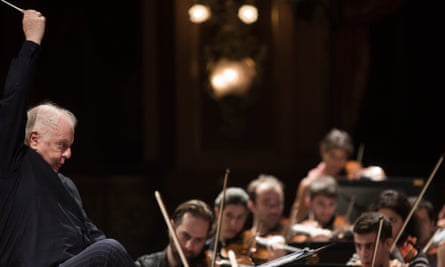
“STOP.”
The longer this went on, the more the ensemble wilted. After two weeks of concerts and rehearsals, they were already “really exhausted,” one said to me. “A lot of music in the head and a lot of problems.” Finally, on being allowed to progress on to the next few bars, the players burst into an ovation of pent-up frustration.
“The greatness of a musician is measured by the degree of fanaticism he brings to his playing,” writes Barenboim in his memoirs A Life in Music. If, as a violinist, you fail to produce just the right accent on a note: “It should cause you almost physical pain.”
Now, at one such pang of pain, Barenboim wheeled around to his assistant, who had led earlier rehearsals. Two days ago, the shaven-headed and sharp-suited Julien had sat on the stage as a page-turner in Barenboim’s duet with Martha Argerich. As the two legendary pianists sprang through Brahms’ Haydn Variations, Julien had leaned forward to flip the score – only for Barenboim to slap him away, in front of 3,000 people. This time, the assistant sat a few rows back in the dark of the stalls.
Evidently, not far enough back. “JULIEN,” Barenboim yelled. “What have you been doing? They have no clue.” Throughout the rehearsal, the polymath had hopped between English, Spanish, Italian and French – but for 24-carat bollockings he preferred German. His shout “keine Ahnung” carried through all seven storeys of the gilt and red plush of the Colon.
Visiting that week was a conductor at the national conservatory, Rodrigo Gonzalez Jacob. From his box seat, the 35-year-old marvelled at the last of a previous epoch of conductors. Like the late Georg Solti and Herbert von Karajan, Barenboim had made his name during the long boom of the record industry, when classical music could command private budgets on top of public handouts and the term “maestro” was used without irony.
“Some in my generation see him as despotic, monarchical,” Gonzalez Jacob said. “I don’t think any musicians would stand me screaming at them the whole rehearsal, the whole day.” But then, he wasn’t Barenboim. “I’ve learned more in a week of watching than I have in my last five masterclasses.”
That Tuesday, the session concluded three-and-a-half hours later with the warning: “I’m afraid you won’t be ready in time.” Musicians headed back to their hotel for a short rest, before another long rehearsal in the afternoon. Barenboim now had to endure a Guardian interview. On learning I was of Bengali origin, the lifelong friend of Mumbai’s Zubin Mehta regaled me with his headwaggling Indian accent. “Kul-kutta. Vot are you saying?” He has somehow a reputation as a skilled mimic, but this was Peter Sellers. Then came another voice: “Waare’s me boonch of flaars?” This, he assured me, was “the North Coon-try” accent of opera singer Dame Janet Baker.
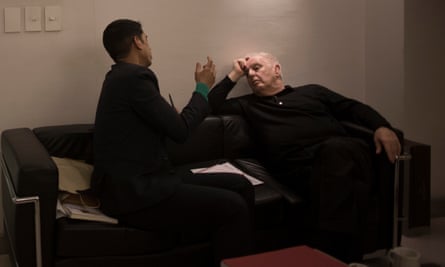
In the five-minute walk between theatre and restaurant, the classical musician was stopped four times by strangers who wanted to shake his hand, touch his arm, thank him. One woman strode up, clapping loudly. “Muy bueno! Muy BUE-no! Felicitaciones.”
It was near here that Barenboim’s own performing career began. On Fridays, he would play chamber concerts at a businessman’s house. “I loved to go mostly because his wife made the best apple strudel.” There, aged seven, he met an eight-year-old Argerich. “We used to play under the piano.”
Both parents were piano teachers, and would take him to see the great musicians touring Buenos Aires. The young Barenboim saw Furtwängler, violinist Adolf Busch and virtuoso pianist Arthur Rubinstein. “You used to queue for three days and two nights for tickets for Rubinstein. People stayed in the queue for the whole day.” The child prodigy enjoyed a “double life. I would go to school, come home and play football, then give a concert.”
As Julien and the cellists would be glad to hear, he also committed plenty of his own gaffes. Take his first-ever recital in Britain, in Bournemouth. The name was rolled around his mouth, like a glug of Malbec: Bawn-mouf. He was into the final strait of a Mozart concerto in E-flat and the “last movements of Mozart concertos are sometimes quite similar in rhythm and speed. Even the melodies.” All of a sudden, “I mistakenly landed in another concerto, this time in B-flat.” Luckily, his conductor had all Barenboim’s humour and none of his temper. “He said, ‘It’s OK – as long as you don’t charge double for playing two different pieces.’”
Having picked the restaurant – a barbecue with a giant firepit in the front window and a corrugated-iron ceiling – Barenboim was now ordering platters of meat, pumpkin and chips. Even as he did so, waiters kept bringing complimentary dishes: metal trays of grilled pork and empanadas. While forking food towards me and his chief executive, Tabaré Perlas, the conductor discussed the members of the Divan Orchestra. He and Perlas could name all 100 of them, from more than 10 countries. They told me where X lived, whether Y was clever. Barenboim works with four orchestras regularly, but it is the Divan musicians that he calls “my people”. While touring, they live in “The Sovereign Independent Republic of the West-Eastern Divan”.
When it began in 1999, “the Palestinians from Nazareth had never met the Palestinians from the territories, let alone an Egyptian or a Syrian.” As Barenboim has written, the hope is that by “hearing the painfulness of the other side for the first time” they “think about the past and the suffering that has lasted so long.” Through sharing a music stand, occupier and occupied could share their histories and their politics. It is an idea that has captivated journalists, film-makers and audiences. Yet over 16 years, the Divan has changed from a youth orchestra to one with its fair share of thirtysomethings with less time and patience for seminar-room discussions. “They need to check on their own children,” one member told me. “Or get a bit more sleep”.
Even more striking is the cooled enthusiasm among the musicians themselves. Some, especially those from Israel, would still vouch for how having colleagues from neighbouring territories has made them more loving of their neighbours. But others saw no point in the orchestra’s hallmark philosophical dialogues: “There’s a lot of heat, but they never resolve anything.”
While admiring of Barenboim, Palestinian violinist Tyme Khleifi acknowledged that whenever tensions rose in the Middle East, they were magnified in the orchestra. She recalled the Lebanon war of 2006. “The Lebanese musicians couldn’t come and the Syrian musicians weren’t allowed to come by their government – out of solidarity with Lebanon. So who did you have? A few Palestinians, a few Egyptians [compared to many Israelis] … even the numbers were imbalanced. There were people whose families were getting bombed on the Lebanese side; there were people whose families were getting bombed on the Israeli side. While all of this was going on, we were rehearsing. The atmosphere was very charged. In Arab culture, music is for celebration. You don’t play music at funerals. And so there were questions about what we were doing here, whether we should be playing at all.” Eventually, Barenboim persuaded the ensemble to play as a “simple statement”.
Reading that story, a cynic could say it shows up Barenboim as a latter-day Quixote. Why does he keep trying to reconcile the irreconcilable? Others might find evidence of moral courage, cleaving to an ideal even as others ditch it.
Holding both Israeli and Palestinian nationalities, and owning a house in Jerusalem, Barenboim has got in ever-deeper trouble in Israel. Its president accused him of “cultural rape” for performing music by Wagner, an antisemite, during a concert there. A government minister called him “a real Jew hater”. For his part, the musician has called the Israeli occupation of Gaza and the West Bank “immoral” and backed a boycott of the Israeli government.
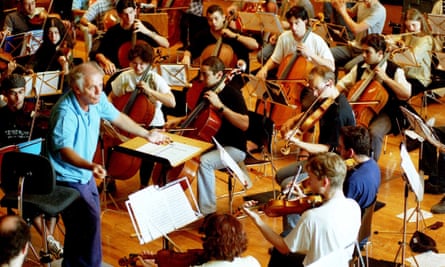
He admits to “one cousin” in Buenos Aires who is “very upset with me”. His voice takes on a pompousness: “I am a Jewish traitor! Champion of the Palestinian cause!”
Last year, he announced plans to take the Berlin Staatskappelle to Tehran. That provoked fury in Israel – before being blocked by Iran on the grounds that it would not grant entry to an artist of “the Zionist regime”. To me, Barenboim claimed: “We’re still planning to go. The concert was not cancelled, only postponed”. But how did he feel under political artillery from both sides?
“The Iranian government still denies the Holocaust – so you can’t take them seriously. And the Israeli government spreads rumours and disinformation about Iran – because it needs to for the creation of panic. I find these theological states – and in this respect Israel and Iran are twin brothers – very, very dangerous.”
To contrast with that polarisation, Barenboim told a story that began in 1966, with him playing the Prague Spring festival. When he got to the stage door, two young men were waiting. They were from Syria and they wanted to see his rehearsals. “I’d never met a Syrian in my life.”
They had coffee and hung out, “a wonderful time”. Then they asked for tickets to the next day’s performance, featuring Arthur Rubinstein with the Czech Philharmonic. Barenboim, who was leaving before the concert, could do nothing. But he did take them in to the rehearsal, then went backstage to mention them to Rubinstein. At first, the legendary pianist thought this was another of Barenboim’s “silly jokes”, before getting excited: “I’ve never met an Arab musician!” All four went for lunch, before Barenboim had to go.
When the West-Eastern Divan orchestra formed in 1999, seven Syrians joined. “I was so curious. How did they manage to come? For Syrians it was against the law to have any contact with Israelis.” He got talking to two “pretty girls” and “after a little flirt”, one of them said, “Sooll-key”. What was Sooll-key?
She tried again: “Soulkhy. He met you in Prague.”
One of those young men waiting at the stage door had gone on to become director of one of the most prestigious conservatories in the Middle East. Thirty-three years later, he wrote to the Syrian minister for culture about a workshop for young musicians in Germany. No word of Israeli involvement, just an assurance of Mr Barenboim’s reputation and a request for a few students to go. “Can you believe that? After 33 years.”
More than a happy ending, it is a tale of the triumph of Barenboimian virtues: improvised cultural exchange, institution-building and a bit of cheek. “I don’t consider myself a political person – I don’t try to make contacts or get the cellular number of a minister,” he says.
But he can do politics – and he can win. Later that week, a violinist from Damascus, Nouras Hanana, told of how he had heard from Barenboim that he had been lobbying the government of Argentina to take in Syrian refugees. “I wanted to hug him,” he said.

Barenboim confirmed that he had rung the new president of Argentina, Mauricio Macri, straight after his election victory in late November. The call was also on behalf of Martha Argerich, he said, since both their grandparents had benefited from the generosity of Argentina in accepting refugees and immigrants.
Macri came to Berlin in July, when Barenboim pressed him again. In the conductor’s telling, the president said it was “a little problematic” but that “I think we can do 3,000”. (Argentina’s Foreign Office confirmed that Macri and Barenboim met in Berlin, but would not provide details of the conversation.) That same week, Buenos Aires announced it would accept 3,000 Syrians. Amid rehearsals at the Colon, Barenboim had also visited foreign minister Susana Malcorra. It is hard to think of another classical musician anywhere in the world who would have put in such an effort – or been taken seriously by a country’s leadership.
Barenboim still boils over with plans. He wants to tackle the gulf between a class of musicians who are technically skilled but ignorant of their society, and a wider society that can’t understand classical music. This autumn his Barenboim-Said Academy in Berlin begins teaching a degree course in music, coupled with twice-weekly philosophy lessons. He is also looking for a primary school in Germany to follow a programme of music education set by him and the Berlin Staatskapelle.
He has already opened a music kindergarten in Berlin and Ramallah. “But when the children go to primary school, most of them forget.” After that will come a secondary school “so if you are an intelligent parent” your child can be taught music “from day one of kindergarten until the Baccalaureate at 18”. Barenboim has two sons with his second wife, Elena Bashkirova: the youngest, Michael, is a successful violinist; the eldest, David used to manage a German hip-hop outfit. They all live in Berlin.
“Music can teach you about life, about how to make passion and discipline co-exist,” cries the maestro. It all comes back to girls – again. “You get madly in love with somebody and you have to continue working and [he claps] it doesn’t work! Then the passion is gone, the girl disappears and you are left only with the work. Then you get only discipline and you get dry and in a bad mood. But in music you cannot play two notes without learning the co-existence of passion and discipline.”
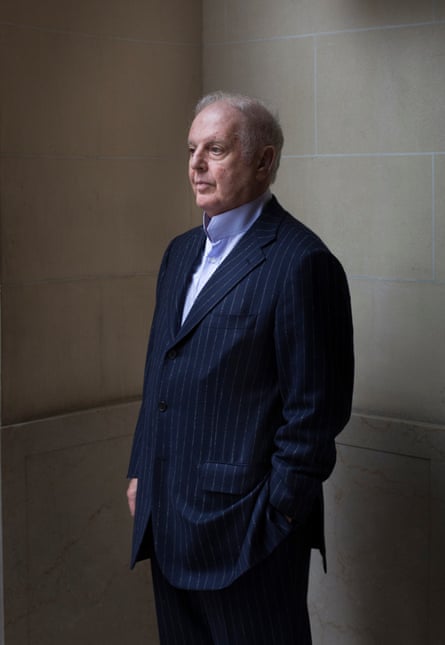
Undercutting all this is a newer fragility. Throughout the week he complains of being “shattered”. He was driving himself as hard as the young musicians, who in turn told stories of how at one rehearsal he had fallen off the podium and cut his leg. At one performance, he had shouted so hard at the violins that his conductor’s baton had snapped and he gouged his own hand.
Asked about his hopes for the future, his first response is: “One thing only: I don’t want to age in such a way that the quality of my life is reduced. There comes a point when you have a separation between brain and body – a brain who wants to think of tomorrows and the body who reminds you of yesterday.” He talks repeatedly of how he can no longer put on his socks standing up. More than once I found myself inspecting him as if he were an elderly relative, for early warnings of issues to be dealt with. This cut on his cheek, that gash running behind his ear.
But on my last night, he and the orchestra are performing to a packed house. I watch backstage. Before going on to perform Liszt, Martha Argerich stomps on the red carpet and growls. In between turns, Barenboim perches on a stool, observing in semi-seriousness to me “the finest girls” in the orchestra. Then the Wagner and the concert are all over and he comes off stage to a standing ovation. On the other side of the curtain are nearly 3,000 people – from the fur-wearer in the stalls to the T-shirt-clad up in the cheap seats – all on their feet applauding this man of a more expansive, optimistic time. He slides off the stool and goes back on stage for another encore.
Daniel Barenboim conducts the West-Eastern Divan Orchestra at the Proms on 17 August. The concert will be live on Radio 3 and online, and available on iPlayer for 30 days.
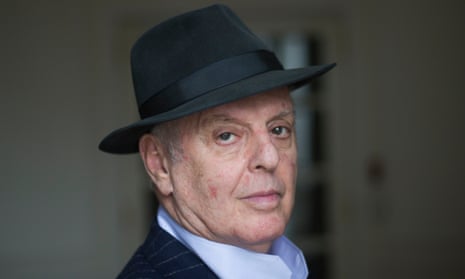
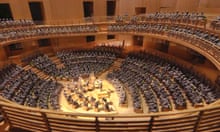

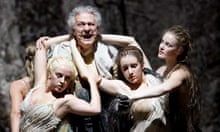
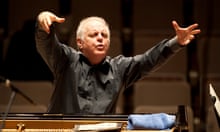

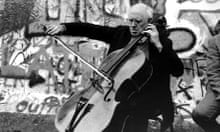


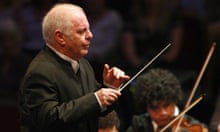
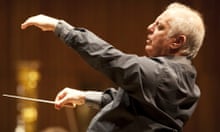
Comments (…)
Sign in or create your Guardian account to join the discussion